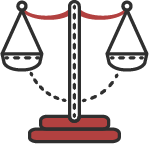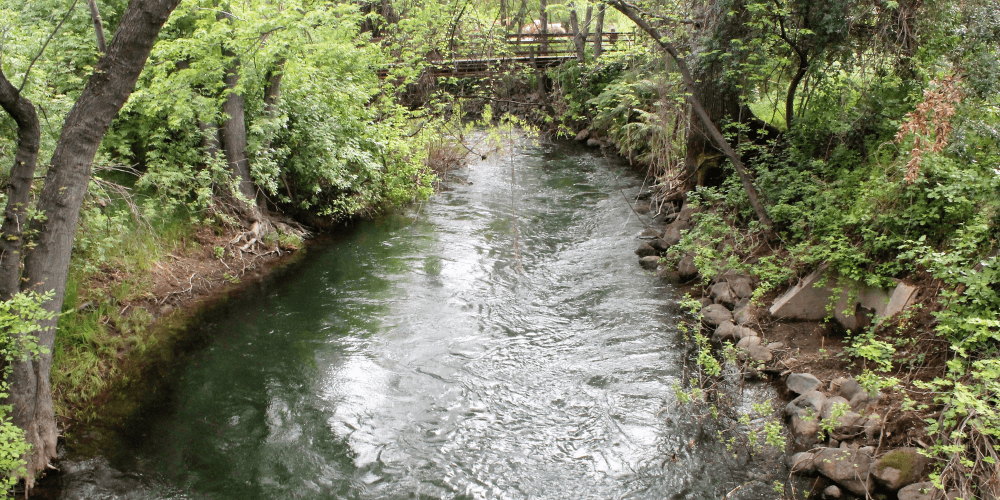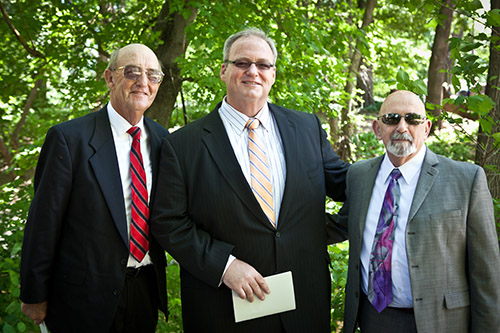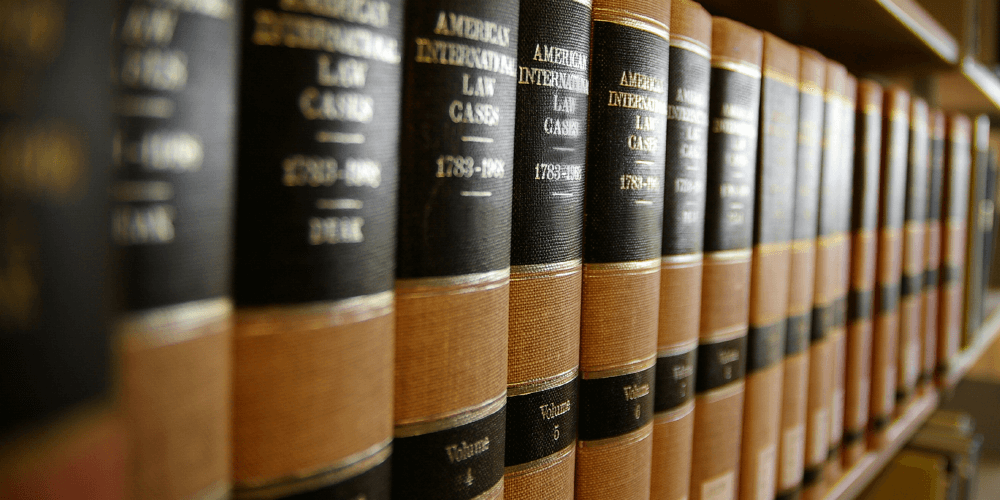Dedicated Faculty, Exceptional Legal Education
About Cal Northern
School of Law
Prior to 1983 there was no law school north of Sacramento serving Yuba, Sutter, Colusa, Butte, Shasta and other Northern California counties and residents of these counties were obliged to commute long distances on a daily basis to earn a law degree. To solve the travel burden a number of civic minded attorneys and judges founded Cal Northern School of Law in Chico, CA. After only nine years in operation, Cal Northern was accredited by the California State Bar and retains that accreditation to this day.
Cal Northern Educational Development Corporation dba Cal Northern School of Law does not have a pending petition in bankruptcy, is not operating as a debtor in possession, nor has it filed a petition within the past five years or had a petition, in bankruptcy filed against it within the preceding five years that resulted in reorganization under Chapter 11 of the United States Bankruptcy Code.
Read More!
The founders of Cal Northern were also concerned that the cost of a legal education had become prohibitive for many students and that attending law school was not feasible for those who were obliged to continue with their employment. To address these concerns the school has kept the tuition rates to a minimum and offers a four year evening class curriculum so that individuals can earn a J.D. degree while still working.
Since its inception the school’s Faculty Advisory Committee has selected instructors primarily from the bench and the bar of the surrounding area who have demonstrated expertise in the subjects they will teach. It was the founders’ belief that active trial lawyers and judges are uniquely qualified to offer their students a legal education that is experience based and practical as well as theoretical, and that they are best able to keep their students apprised of the latest changes in the law.
Throughout the four year program at Cal Northern students are required to take the substantive and procedural courses mandated by the State Bar, however, exposure to the day to day application of the law is also emphasized. Students are offered a wide range of electives during their third and fourth years which are designed to broaden their legal perspective and to better prepare them to be competent advocates upon being licensed to practice.
FACILITIES AND EQUIPMENT
Cal Northern provides sufficient facilities and necessary equipment to support the achievement of the educational objectives of all of the courses and educational programs in which students are enrolled.
Cal Northern is a stand-alone law school, sitting on 2.24 acres located in an executive office park with a large parking lot as well as curb-side street parking. The school occupies 18,570 square feet of the west wing of the building and leases out the remaining square footage. The school includes a lobby with seating, wide corridors, administration, student services and faculty offices, covered patio courtyard, conference/group study rooms, 4 large classrooms with 6-foot tables and built-in electrical outlets, large classroom computer monitors integrated with Owl Technology, student lounge with adjacent coffee/storage/refrigerator/sink facilities, library with computer, photocopying and printing, and a student run merchandise store. Free internet access is provided. Students receive full access to LexisNexis electronic research and to BarBri (a California Bar Review provider) materials throughout their education, both online and in hard copy.


Our mission is to provide excellent, affordable, legal education to residents of the North State.
Cal Northern School of Law seeks to provide an affordable quality legal education to students that is both practical and well-grounded in legal theory. Through a part-time evening law program, students can maintain their employment and be near their families while studying the law. Taught by judges, lawyers and other professionals, the Law School’s curriculum is designed to expose students to the day-to-day application of the law and to prepare them to pass the California Bar Examination and be ethical successful members of the legal profession.
The mission is the foundation and guiding principle of all Cal Northern’s practices, policies and objectives:
- To provide an effective and relevant curriculum and optimized learning environment to assist students in achieving their educational objectives;
- To offer academic support to help students successfully complete their program;
- To maintain admissions policies and programming to ensure access to qualified students who may not otherwise have an opportunity to pursue a legal education;
- To maintain a professional and well-qualified faculty;
- To provide students with experience in practical application of the law; and
- To enhance and sustain the active involvement of students, alumni, faculty, administrators and members of the Board of Trustees in promoting the wellbeing of the Cal Northern community.
The Academic Community
Men and women who pursue a legal career have attained special knowledge and professional skills, and they bear a special responsibility to their clients, their associates, their communities and the fair administration of justice. Cal Northern School of Law seeks to prepare students to competently and responsibly fill the many roles performed by members of the legal profession. We seek to graduate well-rounded persons who possess legal knowledge, skill, imagination and good judgment.
The degree of Juris Doctor is achieved upon the successful completion of the four year course of study. Cal Northern instructors use both the casebook and traditional Socratic method of instruction, together with lecture materials which expand upon the cases and enlighten students as to future rulings expected.
Acquiring a legal education calls for much more than learning substantive rules of law. Law students must also learn how to apply law in the context of litigation, arbitration, mediation and counseling. Solving problems in those contexts requires incisive analysis, creative thinking, effective communication, and skills of interviewing, fact gathering, research advocacy, negotiations and judging.
Cal Northern seeks to train students in learning these skills by instructors who are highly skilled practitioners in the private and public sector of law as well as judges well known for their expertise in certain areas of the law.




Equal Opportunity / Non-Discrimination
Cal Northern School of Law acknowledges its legal and ethical duty to afford equal treatment and opportunity to all persons and thus complies with all applicable laws and regulations that promote nondiscrimination and equal opportunity. It admits students without regard to age, sex, race, religion, physical disability or medical condition, sexual preference, national ancestry, ideology, marital or family status, military or veteran status, or political affiliation to all the rights, privileges, programs, and activities generally accorded to students at the School. It prohibits discrimination against its employees, students and applicants on any of these bases in the administration of its educational policies, admission policies or other School-administered programs. Harassment and sexual harassment are also prohibited. The School of Law also bars retaliation against any employee, student or applicant who files a discrimination complaint against the faculty and/or administration.
Commitment to Diversity


Academic Freedom Policies
Faculty Academic Freedom
Academic freedom includes the freedom to lawfully express opinions, raise questions, and advocate positions in matters of academic or scholarly significance, as well as the general prerogative of an instructor to determine how to present the overall subject matter of an assigned course and the primary right to evaluate the performance of students enrolled in the course.
Academic freedom is essential to the achievement of the Law School’s mission. It is Cal Northern’s policy, therefore, to encourage freedom of inquiry, discourse, teaching, research and publication and to protect members of the faculty against influences that would restrict the exercise of these academic freedoms in areas of scholarly interest. Cal Northern subscribes to the principles of academic freedom formulated by the American Association of University Professors (AAUP) as generally summarized below, but without adopting or endorsing AAUP interpretative statements or other policies:
- Each faculty member is entitled to full freedom in research and in the publication of the results, subject to the adequate performance of other academic duties; research for pecuniary return, however, should be based upon an understanding with the Law School’s Administration.
- Each faculty member is entitled to freedom in the classroom in discussing a subject, but should be careful not to introduce teaching of controversial matter that has no relation to the faculty member’s subject.
- Each faculty member is a citizen and a member of a learned profession. When an instructor speaks or writes as a citizen, the writing should be free from institutional censorship or discipline, but the instructor’s special position in the community imposes special obligations. As a person of learning and an institutional community member, the instructor should remember that the public might judge the instructor’s profession and the institution by the instructor’s utterances. Hence, the instructor should at all times be accurate, exercise appropriate restraint, show respect for the opinion of others, and make every effort to indicate that the teacher is not an institutional spokesperson.
Student Academic Freedom
Reservation of Rights
This Catalog is intended for the guidance of students, faculty and persons applying for admission to Cal Northern School of Law. The Catalog sets forth in general the manner in which the School intends to proceed with respect to matters set forth herein, but the School reserves the right to depart without notice from the terms of this catalog, including, but not limited to courses, tuition and fees. This Catalog is not intended to be and should not be regarded as a contract between the School and any student or other person.
Faculty & Administration
Cal Northern’s professional faculty of distinguished professors are dedicated members of the legal profession, giving time and energy to better their profession and community. In support of Cal Northern’s mission to provide a legal education which is both academic and practical, our faculty all have substantial experience in the practice of law; most maintain full-time law practices and still make time to prepare and teach in the evenings. Our professors are judges, commissioners, and practicing attorneys who bring real world experience to the classroom.
Sandra L. Brooks, Dean & President
Administration
Bachelor of Arts, Political Science and Psychology, California State University, Chico (1985). Master of Public Administration, California State University, Chico (1991). Cal Northern School of Law (1996) Juris Doctor. Associate Dean, Cal Northern School of Law (1999-2000). Dean, Cal Northern School of Law (2000-Present). Member State Bar of California Law School Council (2005-2008).
Michael R. Barrette
Irvine University School of Law (1979) Juris Doctor. Member of the State Bar of California, Yuba-Sutter Bar Association. Private Law Practice.
- Real Property A/B
- Criminal Procedure
- Legal Writing
Jennifer E. Bennett
University of the Pacific McGeorge School of Law (2009) Juris Doctor. Butte County District Attorney’s Office (2010-present). Member of the State Bar of California.
- Evidence A/B
Keya C. Brown
Cal Northern School of Law (2016) Juris Doctor. Private Practice (2016-present). Member of the State Bar of California.
- Alternative Dispute Resolution
Dana L. Campbell
Cal Northern School of Law (2017) Juris Doctor. Estate Planning, Elder Law, Probate, Wills/Trusts. Tyree& Campbell LLP (2018-present). Chief Financial Officer (CFO) Cal Northern School of Law. Certified Public Accountant. Member of the State Bar of California.
- Taxation
- Business Associations A/B
Elise A. Debord, MLS Advisor
Cal Northern School of Law (2023), Master of Legal Studies, Juris Doctor. California State University, Chico (1992) Masters of Science In Nursing. Patient Experience Manager, Risk Management and Compliance Department, Enloe Medical Center. Registered Nurse, State of California.
Chance M. Hansen
Cal Northern School of Law (2018) Juris Doctor. Peters, Habib, McKennan, Juhl-Rhodes and Cardoza, LLP (2018-to date) Member of the State Bar of California.
- Legal Research
Martha A. Gosling, Assistant to Dean / Registrar
Administration
Jonathan G. Lusher
Cal Northern School of Law (2018 ) Juris Doctor. Private Law Practice. Member of the California State Bar.
- Clinical Self-Help Center
- Community Property/Family Law
Sophia R. Meyer
Cal Northern School of Law (2011 ) Juris Doctor. Private Law Practice. Member of the California State Bar.
- Child Welfare Dependency Law
Douglas B. Jacobs, Dean of Students
McGeorge School of Law (1978) Juris Doctor. Private Law Practice. Member of the State Bar of California.
- Constitutional Law A/B
- Intro to Law School and Legal Analysis
- Debtor Creditor Law
Jody M. Peterson
Cal Northern School of Law (2017) Juris Doctor. Private Law Practice specializing in Veterans’ Benefits, Social Security and Family Law. Member of the State Bar of California.
- Clinical Self-Help Center
Dirk Potter
University of California, Davis, King Hall (1982), Juris Doctor. Private Law Practice. Lecturer, California State University Chico (1982-2018). Member of the State Bar of California. President, Butte County Bar Association (1999).
- Contracts A/B
- Employment Law
Kathleen J. Richards
Golden Gate University School of Law (1997) Juris Doctor. Nachlis & Fink (1997-2001). Private Practice (2002-2024). Adjunct Faculty, Golden Gate University School of Law, San Francisco State University Paralegal Program, and Mt. Tamalparis College (1999-2023). Retired/Inactive Member of the State Bar of California
- Introduction to Law and Legal Analysis
- Legal Writing
Hon. Jesus Rodriguez
The University of California College of the Law, San Francisco (formerly UC Hastings) (2004) Juris Doctor. Member of the State Bar of California. Superior Court Judge, Butte County (2018-Present)
- Trial Advocacy
- Professional Responsibility
Com. Leah B. Sears
California Western School of Law (2010) Juris Doctor. Private Practice (2012). Butte County Office of the District Attorney, Criminal Prosecution. Criminal Prosecution Supervisor (2013-2023). Court Commissioner, Butte County Superior Court (2023-Present). Member of the State Bar of California.
- Criminal Law
Michael T. Shepherd
The University of California College of the Law, San Francisco (formerly UC Hastings) (1973) Juris Doctor. Civil Litigation (1974 to present). Member of the American Board of Trial Advocates (1999-present). Member of the State Bar of California.
- Advanced Legal Writing
Adam D. Sorrells
Cal Northern School of Law (1992) Juris Doctor. Private practice (1992-present). Member of the American Board of Trial Advocates and the State Bar of California.
- Torts A/B
Sharon A. Stover, Director of Academic Support
Cal Northern School of Law (1989) Juris Doctor. Deputy District Attorney, Butte County (1993-1994). Chief Deputy County Counsel, Yuba County (1994-1997). Private Law Practice (1997-2002). Director of Butte County, Department of Child Support Services (2002-2016). Member of the State Bar of California.
- Business Associations A/B
- Contracts A/B
- Legal Writing
- Advanced Legal Reasoning
- Special Studies in Civil Discovery
Andrea M. Wieder
Cal Northern School of Law (2021) Juris Doctor. Associate Attorney, Jacobs, Anderson, Potter, Harvey & Cecil (2021-present). Member of the State Bar of California, Butte County Bar Association.
- Advanced Legal Reasoning I/II
Christopher L. Wiemers
Cal Northern School of Law (2021) Juris Doctor. Associate Attorney, Rooney Law Firm (2021-present). Member of the State Bar of California.
- Advanced Legal Reasoning I/II
Erwin D. Williams
Cal Northern School of Law (1996) Juris Doctor. McKernan, Lanam, Bakke and Williams (2000-present). Member of the State Bar of California.
- Wills
- Trusts
Martha K. Wilson, Director of Institutional Research
Cal Northern School of Law (1996) Juris Doctor. Private Law Practice (1996-1998). Deputy County Counsel, Yuba County (1998-2006). Human Resource Director/Risk Manager, Yuba County (2007-2015). Lecturer, California State University Chico (1982-2015). Member of the State Bar of California, Butte County Bar Association.
- Civil Procedure A/B
- Advanced Legal Reasoning I/II
Kurt W. Worley
University of California College of the Law, San Francisco (formerly UC Hastings), Juris Doctor (2003). Office of the District Attorney of Butte County, Deputy and Supervising Deputy District Attorney (2004 – 2011; 2011 – 2020). Butte County Superior Court, Commissioner of the Court (2020-2024). Wildlife Heritage Foundation, Executive Director (2024 – Present). Member of the State Bar of California.
- Criminal Law A/B
- Advanced Legal Writing
Christopher J. Young
Lincoln Law School of Sacramento (2022) Juris Doctor. Savage, Reimer and Associates, LLP (2023-Present). Member of the State Bar of California.
- Real Property A/B
Deans & Professors Emeritus
Hon. Dennis J. Buckley, Retired
Hon. Al H. Carrion, Retired
Hon. Donald K. Wahlberg (1935-2013)


Board of Trustees
Chair
Private Law Practice, Licensed California Realtor
Secretary
Professor, Dept. of Political Science, Retired
Supervising Attorney, Community Legal Information Clinic (CLIC), Retired
California State University, Chico
Members
Professor, Dept. of Political Science
Internship Coordinator, Legal Studies Program
Supervising Attorney, Community Legal Information Clinic (CLIC)
California State University, Chico
Alan L. Mittman, J.D.
Professor, Cal Northern School of Law, Business Associations
Desiree J. Vance, J.D.
Private Law Practice
Honorable Tamara Wood
Judge
Shasta County Superior Court
Institutional Research
Mission
The mission of Institutional Research at CAL NORTHERN School of Law is to collect, compile and analyze data that will provide informed decision making in support of CAL NORTHERN’s overall mission. Institutional research supports the academic and operational activities of the School.
Functions
Some of the functions of Institutional Research consist of:
- Organizing the data collection process and its ongoing maintenance and quality
- Collect, analyze, and provide routine reports as well as ad hoc reports in support of strategic planning
- Collect, analyze, and report summaries of academic data about CAL NORTHERN School of Law required by the federal government, accrediting agencies, and other external agencies
- Collect, analyze, and report data in support of program review and other routine student learning outcomes assessment
- Design, plan and administer institutional surveys to faculty, students, and staff








